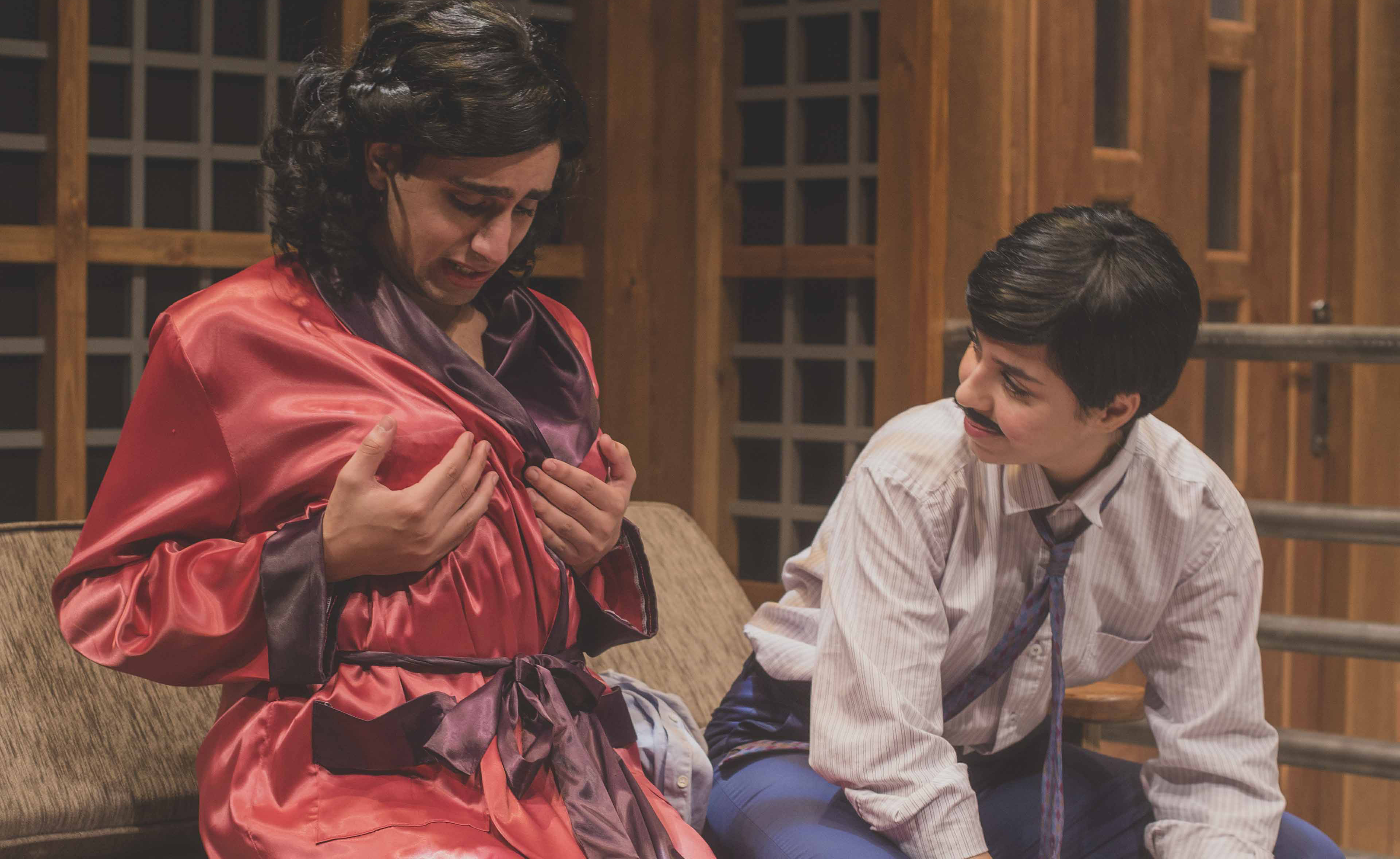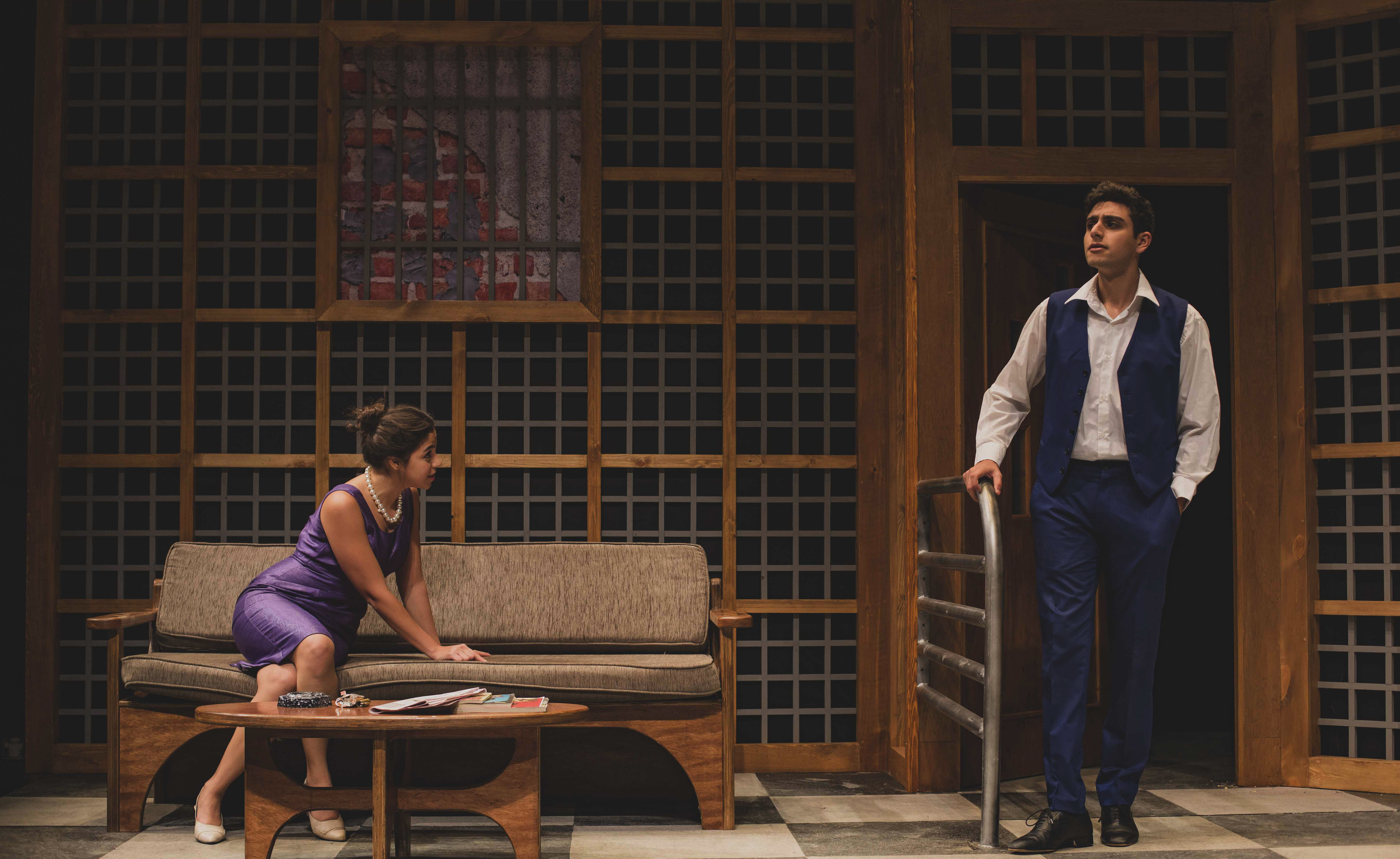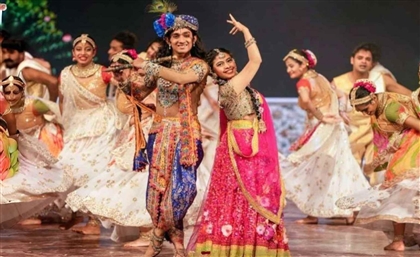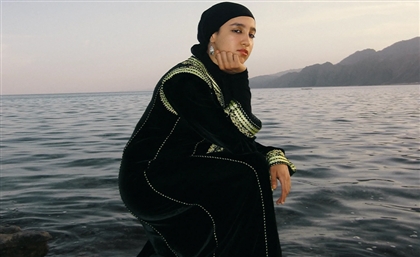El Araneb: The AUC Play Deconstructing Gender Roles Through Comedy
Resident art nerd Ruby Awad reviews the AUC play El Araneb.

In light of today’s political climate, the art we consume has adapted to it and has been allowed to grow. So many ideas and different expressions of them have blossomed in the age of communication and we have seen them ripple back into society on all scales; this is what makes a play like El Araneb, special. Outwardly challenging gender norms, hypocrisy in the Egyptian household, all while being belly-achingly funny, and performed by students, no less.
The setting of El Araneb takes place in the familiar mold of an Egyptian household: A working man, Osama, and his housewife, Esmat. Osama is a lawyer and Esmat used to be one as well. The play begins with a debate between the couple in regards to why she can’t go back to work. Osama uses the age-old excuse of “that’s just how it’s supposed to be”; He’s a man, she’s a woman- they’re both in the right place. Esmat retorts with the fact that she’s an educated woman who can’t let all her degree and achievements go to waste; that they’re equals.
 Esmat and Osama
Esmat and Osama
“The philosophy of the play is that women should be able to work. There are no logical reasons that support the idea of women not being able to work and staying in the house just to take care of household chores,” says Tayam Amar, who plays Osama. “Society tells us that men are the ones who should go out and work to provide money for the family. The play discusses this dynamic and how ridiculous it is to be sexist in that sense.”
Despite the couple being educated lawyers, Osama still adheres to his backwards way of thinking. Reem Amer, who plays El Araneb’s heroine, Esmat, adds: “The ideology of that a woman’s place is at home has nothing to do with classes, which is evident in Osama and Esmat’s household. You can find this kind of sexism in any upper class household.”
Osama tells his wife that she gets to buy all the things she wants in their one-income household; that he provides and all is well. She goes silent. Osama thinks he’s won the argument, but little does he know that she’s secretly planning to retaliate.
Nafea and Nawal, played by Kirolos Zarif and Sondos Moussa, are engaged and run their business together, whom Esmat does legal work for from her home while Osama’s gone, all kept on the hush-hush obviously. Both Nafea and Nawa work as equals and go together like ful and falafel. No, really; Nafe3 is a ful vender and Nawal is a falafel vendor.
Their introduction to the play is juxtaposed with Osama and Esmat’s dynamic. Nafe3 isn’t phased by Nawal’s capabilities to provide, unlike Osama, whom his basis of having his lawyer wife stay at home is that he’s afraid of what other men will say about his capabilities to provide; that it’ll emasculate him. The vendors’ union show that women being equal doesn’t interrupt the harmony of a home and is a physical example of how unfounded Osama’s and many other men’s reasoning is.
Nawal and Nafea
Osama and Esmat get frequent visits from their neighbors El Sheikh Maarouf, played by Youssef Amir, and his wife Baheya, played by Rehab Shalaby. During one of their visits, they bring their daughter Amani along, played by Sara Osman. Amani is a fresh graduate with an evidently bright future. That is, until it’s thwarted by her father. El Sheikh Maarouf is one of the men in the play that exhibit toxic masculinity, making him see his daughter as a pawn to sell and marry off to a rich family with whom he can reap the benefits, despite her educational achievements. Amani even presents a letter stating that she’s been granted a scholarship for a scientific study abroad. Nonetheless, her father can’t see past her gender. Esmat jumps to Amani's defense, explaining to Sheikh Maarouf on what a shame it would be for the marriage to go through, which she said would mean all those years spent in college meant nothing- just because she’s a girl.
Left to right: Baheya, Amani, Esmat, Sheikh Maarouf, Osama
Enter eccentric Doctor Younis, played by Marwan Abdel Monem, cousin of Esmat and biology enthusiast. Despite his kooky demeanor, Doctor Younis serves as a sort of voice of reason in the play other than Esmat, and he has radical plan to help set the record straight. He combats all the sexism in the play by shutting all the male reasoning down with straight facts; his emphasis being on the only difference between a man and a woman is biological and anything past it is subjective and invalid. At some point he even boils it down to chromosomes, with the difference only being the X and the Y.
Doctor Younis
Doctor Younis conducts an experiment with the ambitious venture of switching male and female genders. He announces that the experiment was successful on rabbits, giving the play its namesake. After a fight between Esmat and Osama when it’s revealed that she never stopped working, the couple sleep in separate rooms. The mad scientist sees this as an opportunity and gives them both a shot of his “unicisim” serum. Then, chaos ensues.
The experiment turns out to be a success, and Esmat and Osama wake up as the other gender, literally. Osama is horrified, naturally, while Esmat seizes the chance to give her husband a taste of his own medicine. The play continues with Esmat going to work and Osama staying at home, telling people they are Esmat and Osama’s cousins. Osama underestimates the situation thinking Esmat won’t be able to handle work, while he stays at home and seems to actually be enjoying the freedom of not having anything to do.
Aleya
Despite the traumatising situation, the couple somehow get excited and sleep together. In opposite genders. That’s a role reversal if I’ve ever seen one.
After their “time” together, reality sets in for Osama as he realizes being at home is what it’s cracked up to be. Their maid Aleya, played by Yara Emam, walks Osama through his new matronly duties. Osama calls the office to check on Esmat, only to find out that business at the law firm is better than before. Esmat was able to do what he could do better while he’s stuck at home, left to the mundane tasks he usually leaves his wife- sitting down sewing his shirts. It’s the ultimate manifestation of his demasculinization.
Osama
“Osama is very stubborn and opinionated. He loves his wife but sometimes his anger and pride can get in the way of that,” says Amar, “He goes through this life-changing event that forces him to change his mind.”
As many women know, it’s hard to be heard. We’re often cast off to the periphery while men stay at the core. Not being able to understand the way his actions towards his wife affect her until he literally becomes a woman himself is not only a reflection of Osama’s stubbornness, but of the many men that think the same way he does. I’m sure plenty of women would love to give Doctor Younis’s unicism a go on the men in their lives.
“The play taught me that we as people, or men specifically, tend to get blindsided by our pride,” says Amar. “That shuts down our logical part of the brain, so we yield to our sexist egos sometimes.”
Osama increasingly grows miserable of life as a woman as Esmat treats him exactly the way he had treated her- left at home with no work, no life, no fulfilment. The mundanity of it all finally hits Osama when complaining to Doctor Younis about his predicament and calls this kind of life a “prison”.
“Esmat is the voice of so many women that are going through the same thing the environments and circumstances could be different from one woman to the next, but the message is still the same,” says Amer, “there are so many women who go through the exact same thing, they can’t express how they feel because of the male dominance in their lives. She represents so many women all around the world as well as courage and patience to speak up and make her husband understand until her voice was heard.”
Esmat
As Osama finally learns his lesson and Esmat gets her message across, it’s time for the unicism to be undone. Doctor Younis takes Esmat aside and says he won’t be able to for another couple of months. Esmat, who had been enjoying her freedom and giving her husband a taste of his own medicine, is now as horrified as her husband is. Remember their little honeymoon in the beginning of the experiment? You guessed it- Osama's pregnant. The irony of it all.
Somehow the couple is delighted. In their celebration, Osama is ready to take on the pregnancy, ending the play on the line: “After all, aren’t women and men the same?”
El Araneb is the type of play that we don't get enough of in Egypt. It's intelligent albeit hilarious, and makes a serious and often polarizing topic easy to digest without sacrificing content.
Photos: Ahmed Hassan
- Previous Article Thomas Cook Trips to Egypt Jump by 40% Over 2018
- Next Article New Cairo Now Has its Very Own Indoor Rock-Climbing Wall
Trending This Week
-
Apr 24, 2025























